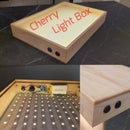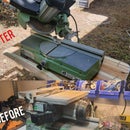Introduction: AliExpress Transparent Power Bank Assembly
If you're like me, you have lots of unused Lithium cells laying around your shop. These come from different sources, like dead power tools, or skateboards that no longer move, etc. The point is these are just laying around, and unused.
So, why not make something useful out of it, like a nice power bank.
That said, I'm almost embarrassed to put this out here... Any DIYer can rig a basic power bank with eyes closed.
However, these things appeared out of nowhere, and are appealing to anyone: the price is good and the performance will be better than a very cheap power bank bought.
So, this instructable is for anyone that wished to use these kits and assemble them. Shall we begin?
Supplies
First of all, you'll need one of the kits. I made this one.
Second, cells of course. I had a box for 8 18650 cells, and I used the Samsung ones that went through my longboard once, and are in the box ever since. If you don't have any and still want to give it a try, these will work. Just pick something with flat top.
Simple spot welder, I have an older version of this one. These kits are really tight and soldering is tricky, so welder is a must.
Nickel strips for the welder, I used 0.1mm thick. Any spot welder (even weak and cheap one) should be able to weld those.
Soldering iron and some wire.
Hand tools like tweezers and screwdriver.
Step 1: Assemble the Batteries
The general idea here is to assemble all of the available cells in parallel, this means all the pluses (+) are connected together and all the minuses (-) are connected together.
Arrange the cells as shown in pictures.
- All the minuses are sticking upwards and connected together.
- Each 4 pluses are connected together, use fish-paper for proper isolation.
- Then the nickel strips at the minus side are folded, in such a way as to give you 2x2x2 brick.
- During folding, you should connect the two plus ends with wire through the space in the core of the brick. The wire is soldered to the strips, don't heat the cells too much.
Step 2: Dos and Dont's
If you ever made a battery out of cells, you know that nickel tabs are usually a very good idea.
Not this time.
The tolerances of the box are so small that it cannot close with the tabs. So learn from my mistakes and run the wires directly from the poles, see the last picture.
Step 3: Put It in the Box and Solder the Main PCB
Put the pack into the box and fit the upper plastic, note how the wires should stick out.
Then solder the wires to the PCB.
Finally fit the PCB on top the plastic cover.
The tolerances are really tight here, so wiggling and cursing not uncommon.
Step 4: Screw the Upper Panel and Fit the Screen Cover
Once the wires are soldered it's a good idea to check if everything works. You can do it by trying to charge the power bank and charging your phone from it.
If everything works, go on and use the smaller screws to connect the PCB to the upper plate. There are four small screws and the holes are clearly visible.
When everything in place, just drop the screen cover on the screen. As you see from the gif, it does give the necessary contrast to the display.
Step 5: Slide on the Transparent Body and Plug the Ends
Take one of the end covers and plug it in. Each one has plastic clips and two screws.
Once the clips are engaged, use the screws to fix it in place.
Then slide over the transparent cover, this phase is satisfying.
Then plug the other end with similar fashion.
You're done!
Step 6: Final Thoughts
I think it's a great option for a power bank if you already have the cells.
It does give you the advertised ~20W and it's good looking, with USB Type C option for in and out.
The mechanical tolerances can be looser to a more convenient fit but for the price it's ok.
And these are available in different flavors - 21700 cells option, or slightly smaller.
In any case the instructions should be similar.
Enjoy,
Dani













